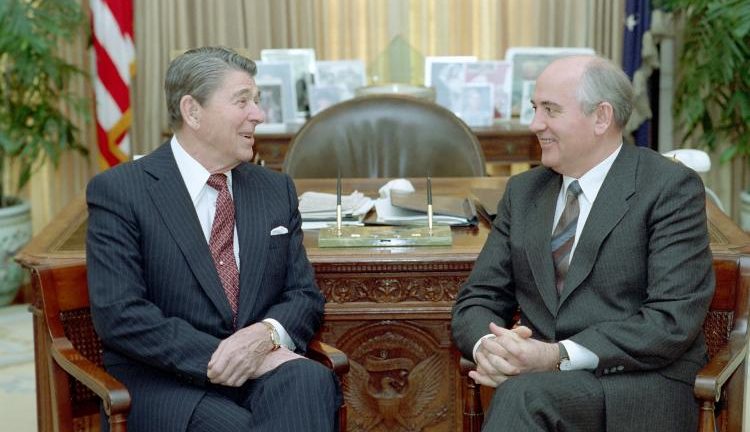By Jonathan Power*
LUND, Sweden. 1 August 2023 (IDN) — What would the conservative president, Ronald Reagan, have done if the Ukraine debacle had happened on his watch? I suspect he would have made sure it didn’t devalue relations between the US and Russia.
It wasn’t him nor his vice-president, George W.H Bush, who inflamed relations with a post-Cold War Russia, it was his successor the liberal Democrat, Bill Clinton, who, together with a supine EU membership, decided to expand NATO right up to Russia’s doorstep, despite a solemn US promise given personally to the Soviet president, Mikhail Gorbachev, by Reagan’s secretary of state, James Baker, that it wouldn’t.
And when a Democrat again became president, Barack Obama wouldn’t say clearly and out loud that the US didn’t expect that Ukraine would ever join NATO, a move that could have de-escalated the crisis faster than you could say: “At last Obama understands where President Vladimir Putin is coming from”.
Now a few words from Jack Matlock who was US ambassador to Moscow under presidents Reagan and Bush senior:
“The Ukraine crisis is a product, in large part, of the policy of indefinite expansion of NATO to the east. If there had been no possibility of Ukraine ever becoming part of NATO and therefore Sevastopol (the ex-Soviet naval port in Crimea) becoming a NATO base Russia would not have invaded Crimea.”
He goes on to say: “Americans have lived for nearly two centuries with the Monroe Doctrine [which forbids non-Americans to seize land or intervene in Latin America]. Why don’t we understand that other countries are sensitive about military bases from potential rivals not only coming up to their borders but taking land which historically they have considered theirs. These are extremely emotional issues—issues that are made to order for any authoritarian leader that wants to strengthen his rule”.
In Foreign Affairs, Alexander Lukin, vice-president of the Diplomatic Academy of the Russian Ministry of Foreign Affairs, added a point: “It was only a matter of time before Russia finally reacted to Western encirclement”.
Matlock’s final point is that, “You have almost a clique in Washington that just can’t look at any atrocity in the world without wanting the US to get involved militarily.” [Despite Iraq, Libya and Afghanistan which all fell to pieces after NATO interventions.]
Matlock was the top Soviet expert in the Reagan Administration before he became ambassador. His great predecessor in this role, George Kennan, went to his grave warning that an expansion of NATO would be totally counterproductive.
Increasingly forgotten are the efforts made my Gorbachev and then the first president of Russia, Boris Yeltsin, to cement a close relationship with the West. The West at the G7 summit in London in 1990 refused to respond to Gorbachev’s request for economic aid, although that could have kept him in the saddle, removing many future headaches for the West, indeed the world.
There would have been no Chechnyan war, no Ukrainian imbroglio and a lot more nuclear disarmament, even down to zero which Reagan and Gorbachev tried to consummate at their summit in Reykjavik. Later when Yeltsin appealed for help Washington sent to Moscow a delegation to insist that Russia pay down its debts and offered not even a single dollar to re-float the Russian economy.
The US and the EU had a zero-sum mind-set left over from the Cold War which they believed, erroneously, their policies had won.
The NATO issue has long been the top one for Moscow. On its heels is Russia’s preoccupation with the Russian language issue. The leaders and legislators of Ukraine should have made it clear a decade ago that Russian is an equal language with Ukrainian. That would have removed much of the resentment that Russian-speakers in the south and east of Ukraine felt.
The West now treats President Vladimir Putin as an outlaw. Policy makers see, to quote Jesus, the “speck” in his eye but “not the beam in their own”. The US and EU made it clear, in effect, to the then president of Ukraine, Viktor Yanukovych, that the arrangement he and most Ukrainian-speaking citizens wanted, a trade deal with the EU, could only come about if Ukraine cut off its negotiations about joining Putin’s Eurasian Economic Union.
Yet with skilful diplomacy Ukraine could have had both. That combined with a statement by President Volodymyr Zelensky that Ukraine was not seeking to join NATO would have avoided this pointless but terrible war.
Is one surprised that Putin probably says to himself, “The West be damned”?
Copyright: Jonathan Power.
* Jonathan Power was for 17 years a foreign affairs columnist and commentator for the International Herald Tribune, now the New York Times. He has also written dozens of columns for the New York Times, the Washington Post, the Boston Globe and the Los Angeles Times. He is the European who has appeared most on the opinion pages of these papers. [IDN-InDepthNews]
Photo: US President Ronald Reagan Says Goodbye to Soviet General Secretary Mikhail Gorbachev After the Last Meeting at Hofdi House Reykjavik Iceland, 10/12/1986. Wikimedia Commons.
IDN is the flagship agency of the Non-profit International Press Syndicate.

